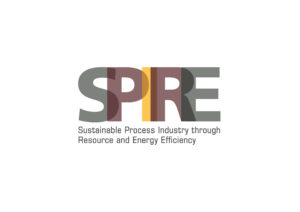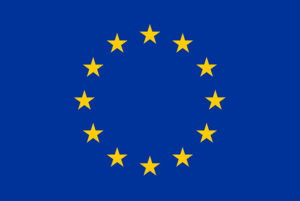Antonio Alcaide Moreno, Miguel Ángel Castán Lascorz, Valter Tavares
This work proposes a Computational Fluid Dynamics (CFD) model of a cement rotary kiln capable of reproducing some 3D effects which cannot be solved by simpler models. Specifically, flight behaviour and falling position of fuels particles are captured. Furthermore, detailed combustion chemistry (devolatilization, char combustion and moisture evaporation) is solved. The 64-meter-long kiln burns a blend of petcoke and Refuse Derived Fuel (RDF). Both were characterized and their properties introduced in the model. The clinker bed was simplified by fixing a temperature profile, a typical approach in literature. Different air excess numbers (λ) were simulated to assess the impact on flight of particles and combustion profiles. The resulting combustion profiles give a valuable input to simpler models in which a much larger and faster set of simulations can be performed, allowing kiln operators to run several different operational scenarios.
Pedro Compais, Jorge Arroyo, Miguel Ángel Castán-Lascorz, Jorge Barrio, Antonia Gil
When monitoring combustion conditions, detecting minor variations, which may be complex even for the human eye, is critical for providing a fast response and correcting deviations. The aim of this study is to detect slight variations in combustion conditions by developing a flame monitoring system using machine learning and computer vision techniques applied to color images. Predictive models are developed for fuel blends with different heating values. The predictive models classify the combustion equivalence ratio based on multiple conditions, using a mean step size of 0.10 between states, a lower value than previously reported in related studies. Three machine learning algorithms are used for each fuel blend: logistic regression, support vector machine, and artificial neural network (multilayer perceptron). These models are fed the statistical, geometrical, and textural features extracted from the color images of the flames. The classification achieves accuracies from 0.78 to 0.97 in the detection of slight variations in the combustion conditions for all heating values. Thus, the monitoring system developed in this study is a promising alternative for implementation on an industrial scale and quick detection of changes in combustion conditions.
Antonio Alcaide-Moreno, Miguel Ángel Castán-Lascorz, Valter Tavares
This work proposes a numerical model of a cement production rotary kiln with a hybrid CFD-1D approach, coupled with a black-box cyclone tower model. A 64 m long rotary kiln is discretized into one-dimensional slices in which both clinker and gas phases are solved numerically. This model aims at obtaining clinker and gas composition, temperature, and several other variables along kiln length. CFD simulations allow to consider some 3D effects which cannot be solved by a 1D model, enhancing the capabilities of the developed model. Specifically, flight behaviour and falling position of fuels particles are captured. Furthermore, detailed combustion chemistry is solved in CFD and introduced in the 1D model, improving the accuracy, and avoiding further computational cost. A set of empirical parameters are obtained using metaheuristic optimization methods to improve model predictions of clinker outlet composition. Six different measurements were used for partial validation of the model, obtaining a 5.66% weighted error in clinker outlet composition, which is reasonable given the high uncertainties of some parameters used in the model.
Jarosław Hercog, Robert Lewtak, Beata Glot, Piotr Jóźwiak, Grzegorz Nehring, Valter Domingos Tavares, Angela Maria Nunes, Daniela Gaspar
Rotatory kilns fed with fossil fuels, which are widely used in cement industry, are responsible for significant CO2 emissions to atmosphere, increasing the stress on the environment. Substantial energy consumption, associated with the cement production process, leads to significant environmental and economical footprint in Europe and beyond, thus measures for reducing fossil fuel usage and decreasing an environmental impact are sought. One of the implemented measures is the substitution of the typical fossil fuels used in the kilns (coal or petcoke) by alternative fuels, such as biomass, RDF (refuse-derived fuel), sewage sludge or MSW (municipal solid waste). The objective is to reduce the greenhouse gas emissions, achieve the circular economy goals and decrease the production costs.
This study presents the results of the pilot-scale tests (conducted in the 1 MW combustion facility at the Institute of Power Engineering), CFD simulations of both pilot-scale and full-scale burner for the cement rotary kiln. On the basis of the experimental data, a numerical investigations of the 1 MW pilot facility was made and validated. The numerical modelling, in a pilot-scale burner, was also intended to check the possibility to co-fire petcoke (as a base fuel) with alternative fuels such as MSW, biomass and hydrogen. Finally, the combustion in the industrial scale 75 MW cement rotary kiln burner was numerically analysed to analyse the conditions inside the reference cement installation and to propose a possible solutions to allow substitution of fossil fuels with RDF.
The results showed that it is possible to co-fire a high shares of the alternative fuels in the rotary kiln without the negative effects on the combustion performance. It was also found, that the base fuel (petcoke) can be almost completely replaced with the alternative fuels such as RDF or biomass, while addition of the hydrogen to the fuel mixture can even improve the combustion characteristics.
Özen, Zeynep Tutku; Taşkın, Hasan Basri; Sarı, İlyas Artunç; Arkan, Başar; Özçelik, Görkem; Fernández, Andrea; Muiños, Santiago; Pozzi, Matteo; Gordini, Angelo; Ferrari, Luca; Hercog, Jaroslaw; Kiedrzyńska, Aleksandra; Glot, Beata
The sustainability vision that gained importance with the European Green Deal, has also affected the Aluminum sector, which is considered as one of the most energy intensive industries in Europe. Starting from this vision, the European Union called for projects, leveraging the Horizon 2020 program, with the concept of using existing raw materials more efficiently and enabling the use of alternative raw materials within various industrial sectors. RETROFEED is one of the projects supported by European commission under Horizon 2020 program. Among the solutions under development for the aluminum sector there are: (1) the usage of alternative
raw materials in ASAS’ aluminum melting furnaces, (2) equipment retrofitting allowing the existing resources to be processed more energy-efficiently, and (3) the design of decision support strategies in order to use the existing raw materials for producing less waste material during production.
Strategical and operational decisions are made by the factory personnel, at times causing slowdown in production and/or inefficient use of resources. Within the scope of the project, a Decision Support System (DSS) will be developed integrating machine learning methods, for predicting billet quality according to different raw material types used in ASAŞ Aluminum Melting Furnaces, and a furnace Digital Twin to simulate furnace operations under different conditions for efficiency improvements and production simulation. By means of correlations and algorithms established as a result of the study, the output of the billet chemical composition, the furnace setpoints and the production plan can be adjusted according to different inputs in 6060 aluminum alloy, in accordance with the principles of zero waste and the new green deal guidelines.
Ana González-Espinosa, Martina del Cerro, Jorge Barrio, Andrea Hernandez, Diego Redondo
Resource and Energy Intensive Industries (REIIs) require large quantities of material and energy inputs to meet the demands of their production processes. The environmental footprint resulting from these operations is therefore substantial and must be reduced to attain more sustainable business practices. RETROFEED is targeted at modifying core process equipment in REIIs to boost energy and material utilisation efficiencies, reduce greenhouse gases (GHG) emissions and replace traditional feedstock with biobased and recycled alternatives.
Patricia Royo, Luis Acevedo, Álvaro J. Arnal, Maryori Diaz-Ramírez, Tatiana García-Armingol, Víctor J. Ferreira, Germán Ferreira, Ana M. López-Sabirón
Latent heat thermal energy storage (TES) contributes as an innovative technology solution to improve the overall system efficiency by recovering and storing industrial waste heat. To this end, phase-change material (PCM) selection is assisted through a decision-support system (DSS). A simplified tool based on the MATLAB® model, based on correlations among the most relevant system parameters, was developed to prove the feasibility of a cross-sectorial approach. The research work conducted a parametric analysis to assess the techno-economic performance of the PCM-TES solution under different working conditions and sectors
Sebastián Zapata, Bárbara Palacino, Juan Antonio Arzate, Martina del Cerro, Ana González-Espinosa, Clara Jarauta-Córdoba
The present study has contemplated the current feedstock to be partially or totally replaced and the alternative feedstock or internal waste to be considered according to quality requirements, market availability, and competitive pricing. While the ceramic sector has centred its effort on the re-use of internal process waste, the aluminium sector, has focused on the introduction of a wider range of recycled raw material. The cement sector, on the other hand, has explored prospective alternatives feedstock for energy production, among which biomass and refused derived fuels can be highlighted. The steel sector intends to curtail fossil fuel dependency through employing biochar and polymeric-derived residues, such as plastic and rubber. Finally, the agrochemical sector plans to partially replace their main phosphorous source by more sustainable materials, such as ashes derived from biomass combustion and organic wastes.
Patricia Royo, Luis Acevedo, Álvaro J. Arnal, Maryori Diaz-Ramírez, Tatiana García-Armingol, Víctor J. Ferreira, Germán Ferreira, Ana M. López-Sabirón
The VULKANO and RETROFEED projects implement and validate an advanced retrofitting solution to improve the overall efficiency and reduce emission in intensive sectors. On this route, a novel high-temperature Phase Change Materials (PCMs)-based thermal energy storage system (TES) for industrial furnaces is evaluated to increase the energy and environmental efficiency by recovering waste heat from the combustion gases. Design details such as preliminary sizing, costs and conceptual design configuration is presented as an example of integration at industrial scale, adapted to the plant operational requirements, by searching the best conceptual design and a proper selection of core materials. A multicriteria analysis is developed and applied to select the most profitable system configuration.

